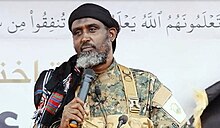Ali Mohamed Rage, commonly known as Ali Dheere, is the head spokesman for the Somali militant group Al-Shabaab, and a member of the group’s supreme council.
Ali Mohamed Rage | |
|---|---|
Cali Maxamed Raage علي محمد راجي | |
 Ali Mohamed Rage speaking at a graduation ceremony for new Al-Shabaab recruits in September 2022 | |
| Official Spokesperson of Al-Shabaab | |
| Assumed office 21 May 2009 | |
| Preceded by | Mukhtar Robow |
| Personal details | |
| Born | August 4, 1966 age 58 Mogadishu, Somalia |
| Nickname | Ali Dheere |
| Military service | |
| Allegiance | (Unknown–1997)
|
| Rank | Official Spokesperson of Al Shabaab |
| Battles/wars | Somali Civil War |
Early life
editAccounts of Ali Mohamed Rage's origins differ. According to Garowe Online he was born in Hawaldag district of Mogadishu during 1966.[1] BBC Somali reported that he was born near the town of El Buur in Galguduud.[2] He is a member of the Murusade sub clan of the Hawiye.[3]
Rage was one of the early youth members of Al-Ittihaad Al-Islaamiya (AIAI), and participated in the groups wars against the United Somali Congress and the Somali Salvation Democratic Front during 1992. He also participated in the 1996–1997 AIAI/Ethiopia war in the Gedo region.[2] Following the dissolution of AIAI in 1997, Rage moved to Mogadishu and became a teacher at Al-Harameyn school. During the rise of the Islamic Courts in Banaadir region, he worked as a trader at a pharmacy in the Bakaara Market and spent his time off assisting Islamic Courts activities.[2]
Al-Shabaab
editDuring the Ethiopian occupation of Somalia, Al-Shabaab’s top spokesman had been Mukhtar Robow. Following a dispute between Robow and the Emir of Al-Shabaab Ahmed Godane during 2009, Rage was made the groups spokes person. He was allegedly chosen by Godane to prevent defections and assure the loyalty Shabaab's Murusade clan fighters.[3] He also serves as the head of the groups 'Office of Education'. In an interview with journalists, he would justify Al-Shabaab's targeting of hotels as legitimate military targets.[4] During the 2011 East Africa drought, he would claim in an interview with Channel 4 News that there was no famine in the Bakool and Lower Shabelle regions.[5] Soon after the start of the Kenya's 2011 Operation Linda Nchi, Rage would publicly warn “We shall come into Kenya if you do not go back.”[6]
In March 2014, the Kenyan Defence Forces claimed to kill Rage.[7] In August 2019, the Somali National Army (SNA) claimed to inflict critical injuries on him during a raid using Somali special forces.[8] October 2022, the SNA also incorrectly claimed that they had killed Rage.[9]
In 2021 the United States marked Rage as a 'Specifically Designated Global Terrorist' and in 2023 put a five million dollar reward for any information leading to his arrest.[1]
References
edit- ^ a b "US offers $5 million for the capture of Al-Shabaab spokesperson". Garowe Online. 2020-06-30. Retrieved 2024-01-11.
- ^ a b c "Muxuu qaban jiray Cali Dheere Al-Shabaab ka hor?". BBC News Somali (in Somali). 2022-10-06. Retrieved 2024-01-11.
- ^ a b Solomon, H. (2015-05-12). Terrorism and Counter-Terrorism in Africa: Fighting Insurgency from Al Shabaab, Ansar Dine and Boko Haram. Springer. ISBN 978-1-137-48989-0.
- ^ Harper, Mary (2019). Everything You Have Told Me Is True: The Many Faces of Al Shabaab. Oxford University Press. ISBN 978-1-78738-124-7.
- ^ "No famine in Somalia, claims al-Shabaab". Channel 4 News. 2011-08-04. Retrieved 2024-01-11.
- ^ Carlstrom, Gregg. "Al-Shabab threatens Kenya". Al Jazeera. Retrieved 2024-01-11.
- ^ "Top Shabaab man dies from injuries". Nation. 6 March 2014. Retrieved 2024-01-11.
- ^ "Somalia: Al-Shabab spokesman wounded in operation, says army radio". Garowe Online. 2020-06-30. Retrieved 2024-01-11.
- ^ "SNA: Al Shabaab spokesman succumbs to wounds in Middle Shabelle region". www.hiiraan.com. Retrieved 2024-01-11.